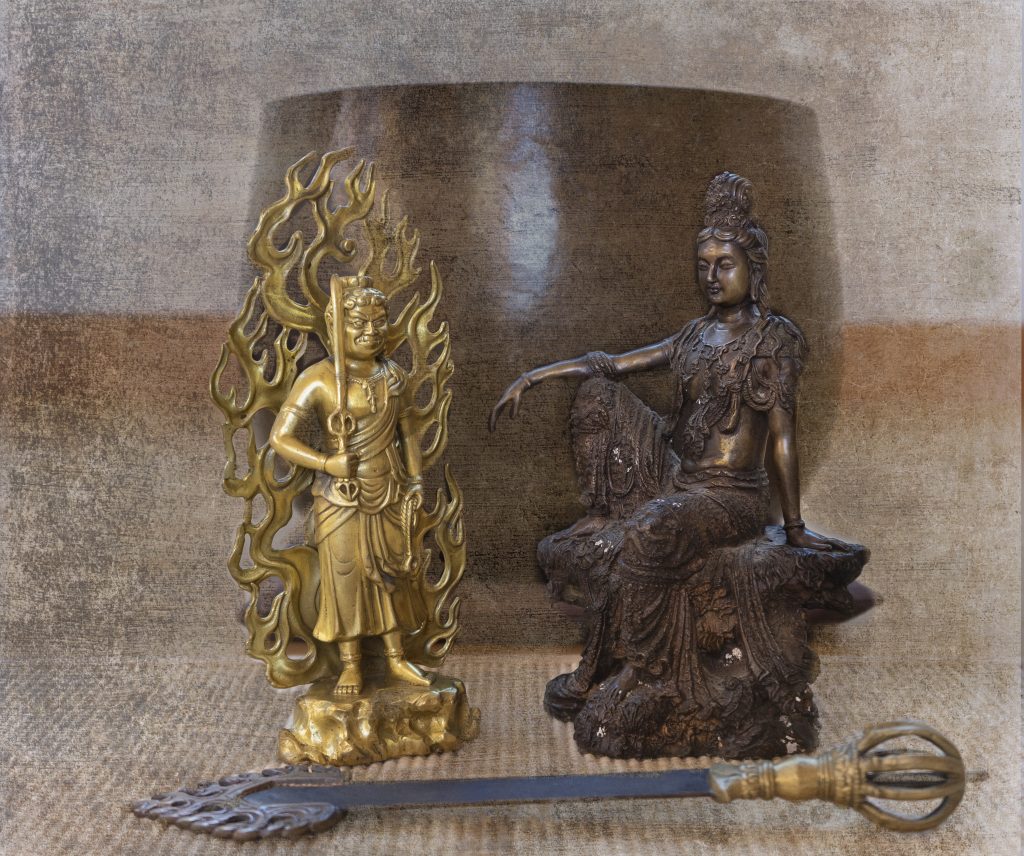
Japanese Buddhist Bodhisattvas, Fudo & Kwan Yin, Photo by Robert A. Jonas
Many non-Buddhists–and some Buddhists–have criticized those who practice Buddhist meditation as way to escape their relationships, their work or their social and political responsibilities. Some have even said that meditation is nihilistic or narcissistic. We believe that these criticisms, especially when they come from people with no actual experience of Buddhist meditation, are not only mistaken: they are dangerous. They are the kind of stereotypes that can lead to inter-religious violence. Still, we should consider the possibility that certain kinds of Buddhist practices can be deflected from their wholeness and beauty by immature teachers or by people in certain cultures.
In 1998, while on retreat in Bodh, Gaya, India, His Holiness, the Dalai Lama told those of us who were participating in a Buddhist-Christian dialogue that sometimes, Buddhists have not acted vigorously to address social and political problems. He told our group, “In this, we have much to learn from the Christians.” Immediately, I thought of the Social Gospel movement in early 20th century America, or the Liberation Theology movement in Central and South America in the mid-to-late 20th century.
I knew almost nothing about how Buddhism was practiced in Asia, but I was familiar with a certain anti-relational, anti-social, and anti-political engagement emphasis among American Buddhists I had known. In the late 20th century, Buddhist retreat centers sprang up all over the United States. One of their most powerful and useful teachings for stressed out, over-extroverted, multi-tasking, information over-loaded Americans, was to simply sit down and pay close attention to one’s own body and mind. This was an important, healing message.
But sometimes Americans mistook this good advice from Buddhist teachers for a radical permission to withdraw from relationships, from society and from the democratic process of political dialogue. Perhaps many of us took to meditation to escape the demands of ordinary lives. Yes, it’s good that we got to know ourselves better on the meditation cushion and that we became more grounded in our actual experience. But then, some of us may have crossed a line whereby we got to know ourselves so well that we became fixated on our inner experience and ended up knowing others–our partners, children, neighborhoods, nations and foreign peoples and countries–less well. After all, there are subtle skills to be learned if one is to be self-aware in a detached way while simultaneously staying actively engaged in the outer world with others. It’s possible that we Americans still have a lot to learn about how to do this. And it is difficult because Buddhist wisdom is being filtered and interpreted from an American mindset that is excessively materialistic, individualistic, competitive and narcissistic.
The irony is that sometimes, Buddhist meditation begins by showing us in great detail how our self-centered we are, but ends in contributing to our self-centeredness. Sometimes, Buddhist meditation shows us, in our direct experience, how our solid sense of self is an illusion, but ends by trapping us in the dynamic moment-to-moment details of this same illusory self.
Of course, the danger of self-centeredness is everywhere. It is what we Christians call “sin”, something most Christians believe that we are born with. We all live with the temptation to be more concerned with ourselves, and with our opinions and needs, than with the suffering of others or with God’s perspective and will. In our Christian history, there have been some communities that have found great joy and peace in contemplative silence and mystical oneness with God. But sometimes, these same contemplatives and mystics have become attached to the consolations of their private, inner experience and thereby have become disconnected from relationships and their social and political environment. The term “quietism” has been used for these narcissistically inclined Christians. The challenge for both Christians and Buddhists who practice meditation is to be simultaneously grounded in our moment-to-moment experience while we are actively, healthily engaged in our relationships and political environments.
In the American Buddhist community, many Buddhists have agreed with the Dalai Lama’s statement about the dangers of individualism and narcissism in Buddhist practice. Those
American Buddhists who are trying to correct this tendency have coined the term “Engaged Buddhism” to emphasize the intrinsic connection between authentic Buddhist meditation and social action. The most well-known center of discussion and action regarding engaged Buddhism in the West is the Buddhist Peace Fellowship. Check out their website at: www.bpf.org
We offer the following brief bibliography of books about engaged Buddhism for those who are interested in this topic.
A Brief Bibliography
Badiner, Allan Hunt, ed. Dharma Gaia: A Harvest of Essays in Buddhism and Ecology. Parallax Press, 2005.
Chappell, David W. Buddhist Peacework: Creating Cultures of Peace. Wisdom, 1999.
Eppsteiner, Fred, ed. The Path of Compassion: Writings on Socially Engaged Buddhism. Parallax Press, 1988.
Jones, Ken. The New Social Face of Buddhism: A Call to Action. Boston: Wisdom Publications, 2003.
Kapleau, Philip. To Cherish All Life: A Buddhist Case for Becoming a Vegetarian. San Francisco: Harper & Row, 1982.
Kaza, Stephanie, and Kenneth Kraft, eds. Dharma Rain: Sources of Buddhist Environmentalism. Boston: Shambhala, 2000.
King, Sallie B. Being Benevolence: The Social Ethics of Engaged Buddhism (Topics in Contemporary Buddhism). University of Hawaii Press, 2006.
Kotler, Arnold. Engaged Buddhist Reader. Parallax Press, 2005.
Kraft, Kenneth. Wheel Of Engaged Buddhism: New Map of The Path. Weatherhill, 1999.
Loy, David R. The Great Awakening: A Buddhist Social Theory. Boston: Wisdom Books, 2003.
Macy, Joanna. Mutual Causality in Buddhism and General Systems Theory. Albany: State University of New York Press, 1991.
Macy, Joanna. World as Lover, World as Self. Parallax Press, 2005. (One of our favorite books, in which Ms. Macy combines deep ecology, general systems theory, and the Buddha’s teachings on interdependent co-arising.)
McLeod, Melvin, ed. Mindful Politics: A Buddhist Guide to Making the World a Better Place. Somerville, MA: Wisdom Books, 2006.
Moon, Susan. Not Turning Away : The Practice of Engaged Buddhism. Boston: Shambhala Publications, 2004.
Nhat, Hanh Thich. Interbeing : Fourteen Guidelines for Engaged Buddhism. Parallax Press, 2005.
Queen, Christopher S. Engaged Buddhism in the West. Boston: Wisdom Publications, 2000.
Queen, Christopher S. Engaged Buddhism: Buddhist Liberation Movements in Asia. State University of New York Press, 1966.
Rothberg. Donald. Engaged Buddhism : A Buddhist Approach to Transforming Ourselves and the World. Boston: Beacon Press, 2006.
Sivaraksa, Sulak. Conflict, Culture, Change : Engaged Buddhism in a Globalizing World. Boston: Wisdom Publications, 2005.
